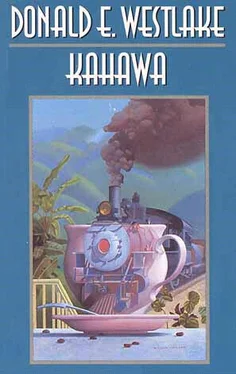They chose an island at random, pulled the canoes well up from the water’s edge, and covered both their boats and themselves with layers of brush. But they were men who had never been in the sky, and were unaware of the clear lines the canoes had made in the mud and the brush, arrow shafts leading from the water directly to their hearts. When the helicopter did return within the hour and, after only the slightest hesitation, landed on the island of their hiding place, they could only believe it was devilry.
The officer in the helicopter was extremely angry. When the six men were found and lined up in front of him, he beat their faces with his fists and lashed their arms with a piece of brush. They had killed one of his men and wounded two others; it was a personal humiliation, an official disgrace, a blow to his hopes for military advancement. It was a blot on his copybook.
The six men denied that they were smugglers, which only enraged the officer more. He kicked their legs with his U.S. Army boots, while a uniformed man with an expressionless white face watched from the helicopter doorway. And when the empty coffee sacks were found, the officer turned cold and dangerous in his fury. He ordered the six men to lie on the ground on their bellies. He ordered his soldiers to pour gasoline onto the coffee sacks, and to spread one sack on each prone man. Then he personally set the fires. The flames in sunlight seemed to dance in midair, lightly, inoffensively, while the tan burlap darkened to match the stenciled black Swahili word Kahawa .
The men writhed and screamed beneath their burning blankets, and the rancid smoke rose into the clear sky as the white man in the helicopter doorway lit his cigar.
The soldiers broke up the canoes with small hatchets, and then boarded the helicopter and were flown away, through the drifting smoke.
This occurred early in March of 1977. It was reported in the London Times on April 5.
Lew Brady picked up the two-hundred-thirty-pound man, turned him over like a sack of potatoes, and flipped him onto the mattress. The other two attackers stood around blinking, openmouthed, not moving forward. “What’s the matter with you birds?” Lew demanded. He grabbed one by his unzipped leather jacket, spun him, yanked the jacket shoulders so the garment came halfway down the man’s arms to hold him like a straitjacket, then shoved him into the other guy. They stumbled together, tripped over the edge of the mattress, and fell on the two-hundred-thirty-pound man.
Lew stood with hands on hips, frowning down at the muddle of men. “I don’t know,” he said. “Maybe you clowns should just join the union.”
One of the other men in the room said, “Mr. Brady, that’s not fair. You’re trained, and we’re not.”
“Training you idiots is what it’s all about.”
The three men on the mattress were beginning to take out their frustrations on one another, with fists and elbows. “Hold it, there, hold it.” Lew leaned down to pull them apart, “ I’ll tell you when to fight.”
They straggled to their feet, and Lew herded them over with the rest of the class: sixteen brawny adult males, all standing around looking sheepish and sullen, like a football team at the end of a winless season. “Line up,” Lew told them. “Face the mirror.”
This large top-floor space in a ramshackle low office building on the outskirts of Valdez, Alaska, was intended to be a rehearsal hall. Several ballet classes met here, as did a Yoga society. One long wall was mirrored. A piano stood in one corner and a cluster of folding chairs in another. Half a dozen ratty mattresses were scattered on the floor. Wide windows gave a view of the used-car lot across the way.
During Lew’s first four months up here in Valdez, while he was learning to pronounce it “Val— deez ” like a native, it had seemed there were no jobs at all here for a man of his profession. But then he’d met Alan Kampolska, who owned a small local trucking operation and was being harassed by union “organizers” attracted by the pipeline construction. Kampolska’s drivers were big and tough, but they didn’t know how to handle themselves against goon squads.
Which was where Lew came in, with his experience as a Green Beret and a mercenary in Africa. Kampolska had offered to hire him to teach his boys how to conduct the war against the union thugs. Lew, bored and frustrated, had agreed. But it was slow hard work, not at all like training recruits in an army.
The main problem was mental attitude. In most self-defense classes it’s the instructor’s job to build self-confidence by a long string of small victories; but these guys were brawlers and sluggers, men who could handle themselves in tough situations, and the problem was they were suddenly facing an enemy too mean and too organized for them. Their reaction was a kind of aggrieved bewilderment, a belief that they were already defeated. So Lew had switched from the orthodox method of ego boosting to an unorthodox program of kicking the shit out of them. If he couldn’t build them up to self-confidence, maybe he could knock them down to self-respect. (And he was also, of course, working off some of his own irritable frustration.)
Now, with the sixteen in a glum row facing the mirror, Lew marched back and forth like the top sergeant he had frequently been. “Look at yourselves,” he ordered. “You’re a crowd of big, tough, no-nonsense sons of bitches, you look like you could hunt bear with a baseball bat, but you walk in here and all of a sudden you’re a goddam bunch of ballet dancers.”
The man who’d complained before complained again. “You’re a trained professional, that’s why.”
Lew shook his head. “Tell me the truth,” he said, making it a general question. “You want to throw in the towel, just give up and join the union?”
“No,” they said. “Shit, no,” some of them said. “Fuck the union,” some others said.
Which was good spirit, but not quite good enough. Lew sighed, and went over to stand directly in front of the complainer, a tall and rangy white man named Bill, who sported several tattoos and a straw cowboy hat. Looking him in the eye, Lew said, “Bill, if we met in a bar and got into an argument, what would you do?”
Bill had the sullen look of a man who expects to be hurting in a few seconds. “Throw a punch at you, I guess,” he muttered.
“And what would I do?”
“Grab my fist, twist it around behind my back, and run me into the wall.”
“You’ve seen me do that.”
“I sure have,” Bill said. The others all chuckled. They loved to see one another get thrown around.
Lew said, “Bill, can you see in your mind that move I make?”
“Sure I can. I dream it.”
“Then do it.”
Bill massively frowned. “I dunno. I—”
“I’m giving you more warning,” Lew told him, “than you’ll get on the street. I am about to throw a punch. You’ll either do the move, or you will become punched in the face.”
“Jesus,” Bill said, and Lew punched him in the face. Bill sat down on the floor, everybody laughed, and Lew sighed.
He turned to another of the men, but what he would have said was drowned out by the sudden roar of a low-flying plane skimming past, barely above the building roof. Everybody in the room instinctively ducked his head and hunched his shoulders until the roar faded. Then Lew saw his students exchange an amused and knowing glance, and he shook his head.
As they all knew, he was living with a pilot named Ellen Gillespie, who worked for the pipeline construction company. She always buzzed him on her return flight so he could drive out to the airport and pick her up.
Читать дальше












